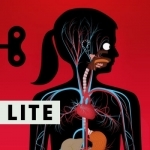
DoorDash - Food Delivery
Food & Drink and Lifestyle
App
Food delivery to your door from the widest selection of restaurants near you. Browse more than...

Foodictionary :: International Food & Beverage Translator
Food & Drink and Travel
App
Foodictionary is your fast and easy translator for food and beverage terminology. This app has been...
Heather Cranmer (2721 KP) rated Oppression (Children of the Gods, #1) in Books
Jun 7, 2018
(I hate writing reviews that are under 3 stars, but I told the author I'd write a review, so here goes).
Okay, so I wanted to really like this book, I really did. It was about Greek gods and goddesses which is a subject I like. However hard I tried to get into it, I just couldn't. It actually felt like a chore, and I hated having to read it. I took a little break from it, but when I came back to it, I still couldn't get into it.
Please keep in mind this review is only going to be about the first 9 chapters as I stopped reading when I got to chapter 10.
The title is a fantastic choice for this book. When I stopped reading, it had gotten obvious why the author chose this title.
I'm not really sold on the cover. It's just too boring for my liking. Again, this book has taken the easy way out by just putting a photo on the cover. Whatever happened to imagination!?!
The world building didn't really seem that thought out. I found myself being nagged by so many questions about Elyse's aging process that I couldn't answer. The whole aging thing just did not make much sense. Based on the bit I read of this book, I just didn't see the world building getting any better.
The pacing in this book was so slow!! I found myself becoming easily bored and not caring about anything that happened. As I said previously, I even took a book thinking maybe it was just me, but when I came back to it, I found the pacing to be even slower if that's possible.
The dialogue between the characters was well thought out. It never seemed forced and seemed to flow with the story. Based on what I read of this book, there was no swearing.
The character of Elyse didn't seem very well-developed. She does not act 89 at all but acts like a teenager. Surely she'd act her age regardless of what age she looked like physically!?! That is what mainly put me off the whole book. I liked William based on the little bit I read about him. He seems like a fun character. I would've liked to find out a bit more about Kara but I just really couldn't force myself to read this book anymore.
Like I said, I really wanted to enjoy this book. Even the synopsis sounded promising. I think the idea of the book is a good one, but it wasn't executed very well. I think if the author had maybe worked on the book a bit longer, it could've been really good.
Overall, I wouldn't really recommend this book unless you aren't very fussy with details or unless you're really bored. If you want to take a chance with it (and you may like it), I'd say it's a book for those aged 13+ from what I've read.
Hazel (1853 KP) rated Dreaming of Antigone in Books
Dec 17, 2018
Dreaming of Antigone</i> is a contemporary tragedy about sixteen-year-old Andria in the aftermath of the death of her twin sister Iris. It has been almost six months since Iris overdosed on heroin, and also the same amount of time since Andria last had an epileptic seizure. Feeling overwhelmed by her mother’s overprotectiveness, Andria is counting down the days until she can reapply for her driving license – freedom. Only fourteen days to go; unless she has another seizure…
Although she is not over her sister’s death, Andria is keeping her emotions in check; but then, Iris’ ex-drug addict boyfriend, Alex, comes back to school. Andria feels hatred toward him and angrily blames him for what happened to her sister. She is beyond frustrated to discover that she has to work alongside Alex in the library after school. However their love of poetry begins to bond them together, causing Andria to question how she really feels. When more tragedy strikes in the form of her stepfather, Andria is glad to have Alex by her side.
<i>Dreaming of Antigone</i> is a mix of high culture and pop culture. It is written for the contemporary teenager who enjoys love stories, yet it also contains a few highbrow topics. Firstly, as referenced in the title, is the Greek play <i>Antigone</i>. Andria is studying this tragedy at school and likens herself and Iris to the key characters, Antigone and Ismene. Secondly is astronomy. Andria is passionate about the stars and educates the reader a little about the names of constellations and the position of the stars and planets in the solar system. Thirdly, as already mentioned, there are lots of poetry citations.
I was a little disappointed that there was not more focus on <i>Antigone</i>, as this is what attracted me to the novel in the first place. Robin Bridges gives a brief overview of the play for the benefit of readers who are unfamiliar with it, however for readers, like myself, who have studied Sophocles’ tragedies, there is not much more to gain from this reference.
Bridges tackles quite a number of difficult subjects in <i>Dreaming of Antigone</i>. There is the obvious issue of drug abuse, which killed Iris. In this case, Iris was a victim of the addiction, however Bridges counters this with Alex, the survivor, thus saying that it is possible to recover from such a dangerous habit. Later on in the story other challenging problems crop up, for example suicide and sexual abuse. Thankfully Bridges deals with these in a mature and gentle manner, so as not to distress the reader. Having said this, some readers may struggle with this triggering content.
Overall, whilst this was not a terrible book, it was not exactly what I was expecting, and therefore a bit of a disappointment. It is for this reason that I am not giving <i>Dreaming of Antigone</i> more than three stars. Other readers with fewer expectations may enjoy this novel a lot more.
Sophia (Bookwyrming Thoughts) (530 KP) rated Gates of Thread and Stone (Gates of Thread and Stone #1) in Books
Jan 23, 2020
Much as I actually read the synopsis once when I first saw it months ago on Goodreads and then again before I clicked "Read Now" on Netgalley, I ended up forgetting the synopsis <i>entirely</i> by the time I started.
Except for one word: Labyrinth. Needless to say, I actually thought for awhile that <i>Gates of Thread and Stone</i> would be about a labyrinth. <i>The</i> Labyrinth of the Greek myths, per say, and when I actually read <i>Gates of Thread of Stone</i>, I checked the synopsis again to set myself on the right track (because when there's no one being sent as sacrifice, you know there's something wrong).
<i>Gates of Thread and Stone</i> is really about a girl named Kai <i>living</i> with her "brother," Reev, in a place called the Labyrinth, named so by its maze-like structure, and where the lowest of the lowest in Ninurta live out their daily lives. But one day, Reev disappears just like many others and Kai is determined to find her brother.
There's something about <i>Gates of Thread and Stone</i> that I really like. It's definitely not the world, even though I highly enjoyed Lee's world-building each section (East Quarter, White Court, Void, Outlands, etc.) in Ninurta were set apart from one another and most even had their own nicknames (East Quarter = Labyrinth, North Quarter = Purgatory). It's most certainly not the amount of possible f-bombs in here as well, or what I'll assume as f-bombs, because "drek" by itself is certainly not sounding like crap or hell.
The characters were tolerable Kai is a determined and persistent character who has an admirable strength and may sometimes be a little feisty. Irra is perhaps one of my favorite characters by far, being a dramatic yet eccentric advisor in assisting Kai and Avan finding Reev. In fact... he's a bit of an oddity compared to the other Infinites, who seem to be similar to gods and goddesses based on their description.
The plot was a little predictable and I was just waiting for a couple of parts to play out (I really should stop being Sherlock Holmes and just enjoy reading the book, but I can't help myself). While the end is similar to the end of <i>Senshi</i> and the beginning of <i>Shinobi</i> and doesn't seem to have a bigger plot that spans over to the sequel or more books.
Now that I actually took the time to write all that down, maybe it's the world-building that I liked the most. With the ending of <i>Gates of Thread and Stone</i> seeming to be a solid ending, I may read the sequel just to for the pure fun of seeing what Ninurta will be like.
<a href="https://bookwyrmingthoughts.com/review-gates-of-thread-and-stone-by-lori-m-lee/"; target="_blank">This review was originally posted on Bookwyrming Thoughts</a>

The Human Body Lite
Education and Medical
App
Try the lite version of the award-winning Human Body app for free! Discover what we’re made of...

RecordBooks
Book and Reference
App
A new way to keep track of books without the need for pencil and paper. This application optimizes...
Bob Mann (459 KP) rated The Hitman's Wife's Bodyguard (2021) in Movies
Jun 22, 2021
Positives:
- As a comedy thriller, it does pass the '6 laughs test' in terms of the 'comedy' element. Some of these are minor chuckles. A few are really good belly laughs.
- Among these are some of the outrageous tirades of Salma Hayek: her accent makes some of the dialogue unintelligible, but given its X-rated nature, that's not necessarily a bad thing! As a mid-50's actress (Oh God - - don't tell her I mentioned her age!), Ms Hayek indeed has an arrestingly attractive form.
- Seeing Antonio Banderas and Morgan Freeman on the screen is never anything other than a positive. (Although Banderas is like Sean Connery in failing to tailor his natural accent to any role he's ever in!)
Negatives:
- A general problem I have with 'comedy thrillers' is that the comedy nearly always negates any of the thrills. Ryan Reynolds is not playing Deadpool in this one, although he might as well be doing so based on the number of times he is hit by cars and other solid objects. The result is that although it has the trappings of a Bond or a Bourne - exotic locations (here, mostly Italian ones) ; exotic woman; car chases; heavily-armed henchmen; huge explosions - it delivers none of the tension or excitement. When matched with some rather dodgy post-shoot special effects, the effect is generally underwhelming.
- If there was an award for the clumsiest movie title of 2021, we may already have a winner.
Summary Thoughts on "The Hitman's Wife's Bodyguard": Sequels are very occasionally better. Often they are much worse. This one, I have to say, delivers very much "more of the same". Given that the writer/director team of Tom O'Connor and Patrick Hughes are in the driving seat, that's not much of a surprise. The shtick is mildly diverting, occasionally downright funny, but quickly outstays its welcome. The 100 minute run time felt, for me, much longer.
Looking back at my 2017 review of the first film, I think I was being over-kind giving it 6/10. I think this is neither better nor worse. So if you want to average the two and give each 5/10, I wouldn't object! But, again, it's one I will struggle to remember much about in a few month's time.
(For the full graphical review, please check out the One Mann's Movies review here - https://bob-the-movie-man.com/2021/06/22/the-hitmans-wifes-bodyguard-a-movie-thats-a-pain-in-the-a-double-dollar-sign/. Thanks).

iTranslate Translator
Productivity and Reference
App
iTranslate is the leading translation and dictionary app. Easily translate text, websites, or start...

Online-Translator.com photo and voice translation
Reference and Travel
App
Online translator, phrasebook, and dictionary for iPhone and iPad —right at your fingertips! New...

